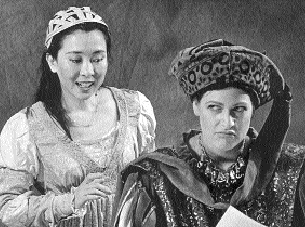Reading Lesson: Tang Lee and Buffy BaggottWest Bay's 'Gianni Schicchi'
and 'Suor Angelica'
By Philip Collins
Not a very cheery subject, death; but a gripping one. In the two, one-act operas by Giacomo Puccini--Gianni Schicchi and Suor Angelica--being presented by West Bay Opera, death is pivotal. Its role, however, is very different in each--villainous as well as redemptive in Suor Angelica, spoofed with the irreverence of a Marx Brothers movie in Gianni Schicchi.
Puccini originally conceived the two operas as part of a trilogy that included another one-act, Il Tabarro (The cloak). The set forms a triptych in the manner of a religious panel, with Suor Angelica and Gianni Schicchi symbolizing heaven and hell respectively. The inclusion of Il Tabarro would have brought purgatory into the picture, although the coupling of these two operas proved charming enough, despite their uneveness in execution. The almost motionless scenario in Suor Angelica was spryly negated by Schicchi's romping madness.
Director Marc Jacobs wisely opted for a snappy English translation by Anne and Herbert Grossman that allowed more immediate appreciation of Giovacchino Forzano's uproarious libretto than mere supertitles could provide. On the other hand, the varying audibility of the singers against Puccini's energetic orchestral backdrops--fashioned exuberantly under the baton of guest conductor Henry Mollicone--would have been bettered by projected texts at times. Schicchi himself, Robert Stafford, came across crisp and intelligible. Nimbly, and with discerning panache, he brought Schicchi's contrivances to fruition grandly.
As Schicchi's daughter, Lauretta, soprano Tang Lee was heartwarming. Lee supported her dulcet tones with a fine instrument that carried considerably better than the voice of her fiancé, Rinuccio (tenor David L. Oliver). Oliver's vocal projection was adequate in only the most exposed instances. The ensemble work was deliciously hammed up by all, although Buffy Baggott was singularly outstanding in her applications of comic nuance (wide nuance, that is).
Earlier in the evening, as the wicked princess in Suor Angelica, Baggott demonstrated her range in dramatic terms with a similarly invigorating performance. At times, the upper limits of range were pinched, but overall, she lent strong vocal presence. Soprano Jillian Khuner brought radiance to the opera's lead role, and her rendering of the famous aria "Senza mamma, o bimbo tu sei morto" was beautifully captured.
The Peninsula Women's Chorus took on the numerous choral posts of this all-woman cast. Donned in nuns' habits and a bit ill at ease, the chorus offered tenderly voiced commentary on the story. Choral blends were spotty, however. The theater's acoustic conditions are drastically less supportive than those of most concert settings, and the chorus managed to compensate only intermittently. The orchestra's performance, guided by guest conductor Patricia Hennings, was painstakingly intimating and lyrical, although more buoyance overall would have brought welcome vigor to the enterprise.
Sour Angelica and Gianni Schicchi play Friday-Saturday at 8:15pm and Sunday at 2pm through Oct. 22 at the Lucie Stern Theatre, 1305 Middlefield Road, Palo Alto. Tickets are $29. (415/424-9999).
[ Metro | Metroactive Central ]

